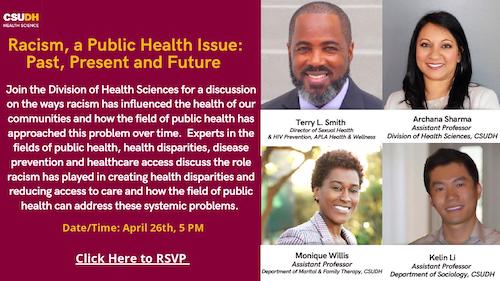By Cindy Portillo, Staff Reporter
The many ways that racism impacts public health, and how it is experienced by college students, will be the focus of a discussion at 5 p.m. today sponsored by the Division of Health Sciences.
Three CSUDH professors will participate in the Zoom event, ” Racism, a Public Health Issue: Past, Present and Future,” which will focus on how racism has influenced and continues to affect, the health of people of color communities and how the field of public health is confronting the issue.
“Racism in public health can affect students in a number of ways, including those attending CSUDH,” said Dr. Archana Sharma, an assistant professor in health sciences, and one of the three CSUDH professors who will lead the discussion. “This looks like underinvestment in public health infrastructure such as health clinics, preventative care, safe and clean areas to recreate outdoors and placing sources of environmental pollution that can be toxic to human health, such as oil refineries or industrial operations, in communities of color. All of these impact public health and impact students in the communities near Dominguez Hills.”
The other two CSUDH professors include: Dr. Kelin Li, from the department of sociology, and Dr. Monique Willis, an assistant professor in the department of marital and family therapy. They will offer their perspectives on the impact of health disparities, disease prevention and healthcare access on people of color and their communities.
Terry L. Smith, Director of HIV Prevention Services for APLA Health, will also be on the panel.
Possible racial bias in terms of healthcare provided to people of color has long been the subject of research.
For instance, a March, 2021 article in Human Rights Magazine by Khiara M. Bridges, found that “scores of studies,” supported the findings of a 2005 report by the Institute of Medicine that found that socioeconomic conditions alone “cannot account for the fact that (Black) people are sicker and have shorter life spans than their white complements.”
Instead, Bridges wrote, “Black people simply are not receiving the same quality of health care that their white counterparts receive,” which Bridges attributed to institutional racism within the public health industry.
“If students are interested in learning about how racism has impacted our communities’ health historically and today, they should attend,” Dr. Sharma said. “ They will also learn how the field of public health is tackling this issue, what to expect in the future, and what types of careers are available in this field.”
For more information about today’s event, which starts at 5 p.m., including how to RSVP and attend, go here.

